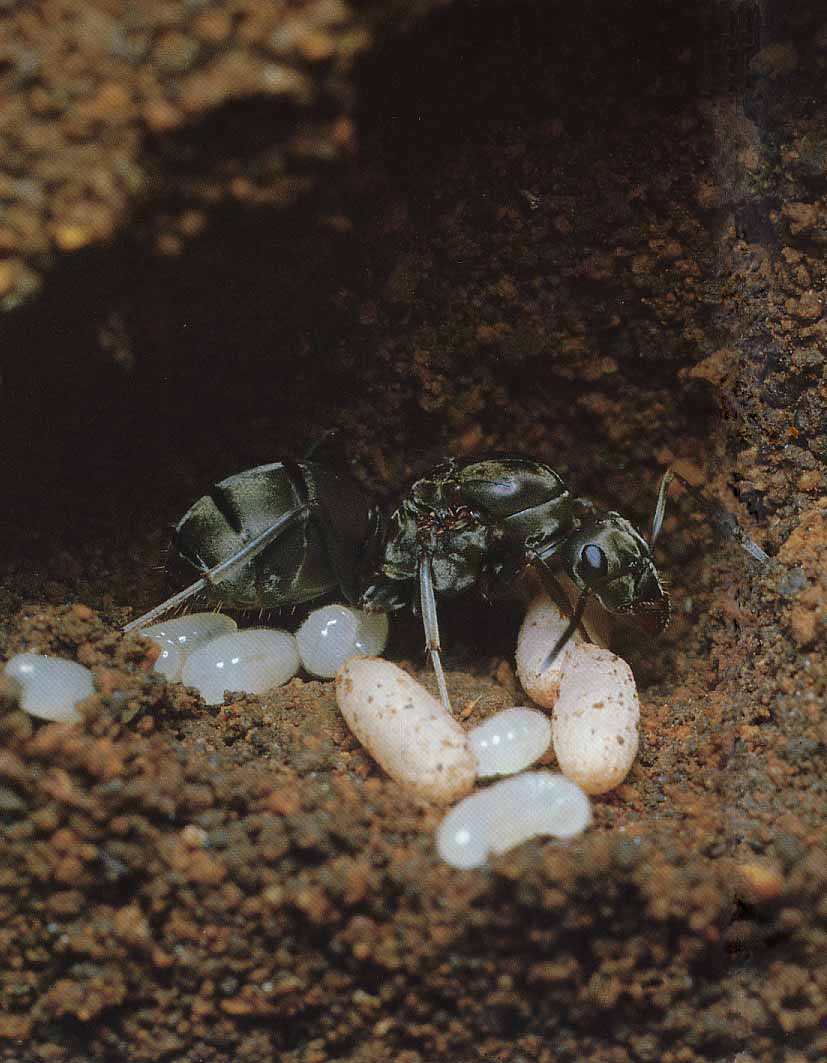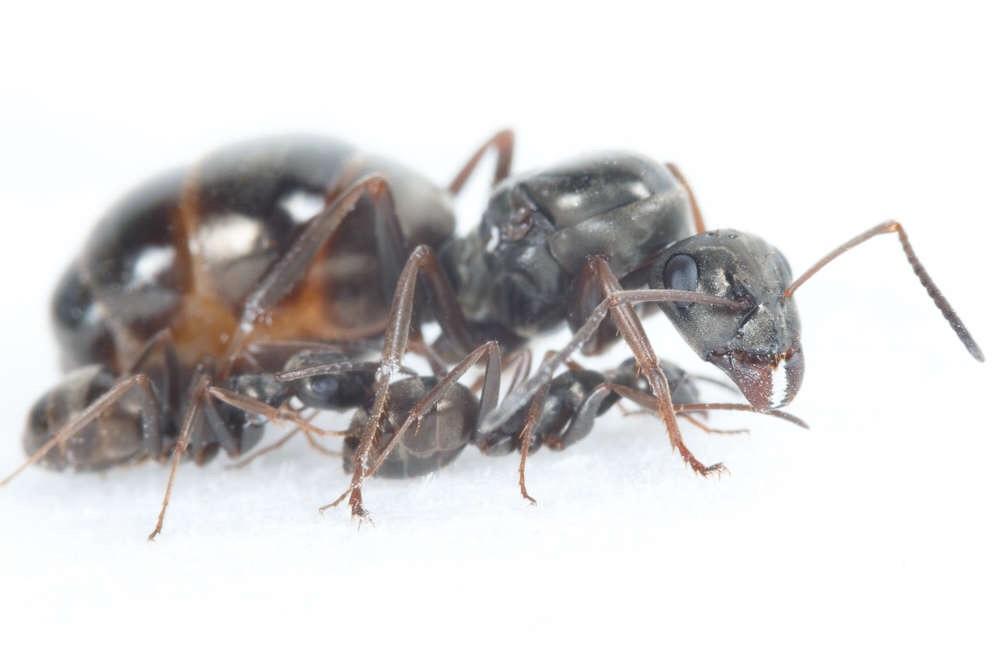Queen ant may stop laying eggs due to stress from exposure to light or disturbance, which can lead to egg consumption or abandonment of brood. Understanding the ant’s natural habitat preferences and providing a dark, calm environment can encourage egg-laying behavior and colony development.
Ant keepers must simulate optimal conditions for the queen to thrive and successfully produce offspring, ensuring the longevity and productivity of the ant colony. By mimicking the underground setting and minimizing disturbances, enthusiasts can support the queen in fulfilling her vital role in the colony’s lifecycle.
Striving to maintain a conducive environment for the queen ant is essential for the overall health and sustainability of the ant population.

Credit: ant.miyakyo-u.ac.jp
Possible Reasons For Queen Ant To Stop Laying Eggs
Queen ants are vital for the survival and growth of ant colonies. When a queen ant stops laying eggs, it can indicate various underlying issues that need to be addressed. Let’s explore some possible reasons for this concerning behavior.
Light And Movement
Exposing the queen ant to excessive light and movement can disrupt her egg-laying process. Some ant species are sensitive to bright lights and disturbances, which can cause the queen to stop laying eggs or even consume her existing brood.
Stress Or Discomfort
Sustained stress or discomfort can lead to the cessation of egg production in queen ants. Stressors such as frequent disturbances, inadequate nesting conditions, or lack of food can negatively impact the queen’s ability to lay eggs.
Temperature And Humidity
Fluctuations in temperature and humidity levels within the queen’s nesting environment can disrupt her egg-laying cycle. Inappropriate conditions may prompt the queen to halt her egg production as a response to the unfavorable habitat.
Food And Water
Sufficient access to food and water is crucial for the queen ant to support her egg-laying activities. Inadequate nutrition or dehydration can hinder the queen’s reproductive capacity, leading to a halt in egg laying.
Disturbance
Excessive and prolonged disturbances around the queen ant can lead to a halt in egg laying. Minimal disruptions are essential to maintain the queen’s reproductive focus without causing undue stress that can impede her egg-laying behavior.
Effects Of Queen Ant Not Laying Eggs
When a queen ant stops laying eggs, it could be due to stress, disturbance, or not feeling comfortable in her new environment. It is important to provide a dark and quiet space for the queen to simulate life in the ground and encourage egg laying.
Additionally, a healthy colony can survive without a queen, but there will be a cessation of egg production.
Impact On Colony
When the queen ant stops laying eggs, the colony’s population growth stagnates, affecting its overall productivity.
Egg Production Ceases
Without the queen laying eggs, the colony will not be able to replenish its workforce and expand further.
Continued Survival
Despite the lack of egg-laying by the queen, a colony can survive for some time due to the existing worker ants continuing their tasks.
Ways To Encourage Queen Ant To Lay Eggs
Improving the conditions for your queen ant can help stimulate egg laying. Here are some effective methods to encourage your queen ant to lay eggs:
Creating Dark Environment
Provide your queen ant with a dark and quiet environment to mimic its natural habitat, encouraging her to lay eggs undisturbed.
Reducing Stress
Avoid sudden movements or disturbances near the queen ant to reduce stress levels, enabling her to focus on laying eggs.
Maintaining Ideal Temperature And Humidity
Ensure the ant colony’s habitat maintains the ideal temperature and humidity levels to create optimal conditions for egg laying.
Providing Adequate Food And Water
Offer a consistent supply of food and water to the queen ant to support her reproductive health and egg-laying process.

Credit: biology.stackexchange.com
Common Issues And Troubleshooting
If your queen ant has stopped laying eggs, it can be a cause for concern. Below are some common issues and troubleshooting tips that you can use to identify and resolve the problem.
Larvae Not Growing
If you notice that the larvae in the colony are not growing, it could indicate a problem with the queen’s egg-laying process. This can be due to various factors such as inadequate nutrition, environmental stress, or disease. It’s essential to monitor the larvae closely and take appropriate action to address any underlying issues.
Queen Not Fertilized
The inability of the queen ant to lay eggs might be attributed to the lack of fertilization. An unfertilized queen will not be able to produce viable eggs, leading to a halt in the egg-laying process. It is crucial to determine the fertilization status of the queen and take necessary measures to address this issue.
Uncomfortable Living Conditions
The queen ant’s egg-laying behavior can be significantly impacted by uncomfortable living conditions within the colony. Factors such as excessive light exposure, disturbance, or unsuitable temperature and humidity levels can stress the queen, leading to a cessation in egg production. Identifying and rectifying any unfavorable conditions is vital to support the queen’s egg-laying activities.
Seeking Help And Support
If you find that your queen ant has stopped laying eggs, it’s important to seek help and support to understand the underlying reasons and find a solution. There are several resources available to ant keepers that can provide valuable guidance and expertise. Let’s explore some options:
Ant Keeping Forums
Ant keeping forums are online communities where ant enthusiasts come together to share their experiences, ask questions, and seek advice. These forums offer a wealth of knowledge and can be a valuable resource when you’re facing challenges with your queen ant. By posting your question or concern on an ant keeping forum, you can tap into the collective wisdom of experienced ant keepers who may have encountered similar issues and can offer insights and solutions. Be sure to provide specific details about your situation, such as the species of ant and any observed changes in behavior or environment.
Professional Pest Management
If you’re unable to find a solution on your own or through ant keeping forums, it may be time to consider professional pest management services. Pest management professionals have the expertise and experience to assess the situation, identify any underlying issues, and provide effective solutions. They can evaluate the habitat, environmental conditions, and other factors that may be impacting your queen ant’s egg-laying ability. Professional pest management services can help you address any potential pest-related issues that may be affecting your ant colony’s health and productivity.
Expert Advice
When dealing with queen ant issues, seeking advice from experts in the field can be extremely valuable. Many websites, such as Queen of Ants, provide FAQs and resources that address common questions and concerns related to queen ant behavior and egg laying. These resources often offer practical tips and techniques to encourage egg laying and maintain a healthy ant colony. Additionally, websites like AntKeepers provide comprehensive guides on caring for new ant queens, including recommendations on creating a suitable environment to promote egg laying. Consulting expert advice can give you valuable insights and strategies to address the issue at hand.
Remember, seeking help and support is crucial when your queen ant stops laying eggs. Ant keeping forums, professional pest management services, and expert advice can all provide valuable assistance in identifying the problem and finding the best solution.

Credit: www.reddit.com
Frequently Asked Questions Of Queen Ant Stopped Laying Eggs
Why Has My Queen Ant Stopped Laying Eggs?
Queen ant might stop laying eggs due to stress from light, movement or environmental changes. This could cause the queen to eat her eggs or halt egg-laying altogether. Mimicking natural underground conditions and minimizing disturbances can help stimulate egg-laying.
How Do You Get Queen Ants To Lay Eggs?
To encourage queen ants to lay eggs, ensure a dark and undisturbed environment simulating life in the ground.
Do Queen Ants Run Out Of Eggs?
Queen ants do not run out of eggs. They can produce thousands, even millions, during their lifetime.
Can A Ant Colony Survive Without A Queen Ant?
Yes, a healthy ant colony can survive for months without a queen. However, without a queen, egg production stops, but the worker ants continue their usual tasks.
Conclusion
If your queen ant has stopped laying eggs, it may be due to stress, disruption, or environmental factors. It’s crucial to provide her with a calm, dark, and undisturbed environment to encourage egg production. By mimicking her natural habitat, you can support her in resuming the egg-laying process.
Additionally, seeking advice from experts can provide valuable insights into resolving this issue.

I’m MD Tanvir, and I bring years of expertise gained from working closely with pest control companies to the forefront. My journey in the industry has inspired me to launch Bug Battler, a platform aimed at equipping people with the know-how to combat pests autonomously. Through Bug Battler, I aim to empower individuals with practical insights to tackle pest infestations effectively.

